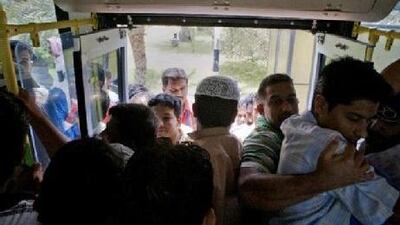It is hot and humid, you are waiting for the bus, and just as it appears round the corner, someone barges past you to get on first. Even in a nation that prides itself on civility, queueing can bring out the worst in people. When Abu Dhabi's bus service made its debut a couple of years ago, it brought with it outbreaks of shoving, scuffles and abusive language, and concern that standards of civility were on the slide.
In the grand scheme of things, being pushed aside or having your parking space stolen may seem trivial, but it's not. Everyone from politicians to dinner party guests use incidents of rudeness as some kind of litmus test for the state of society. Yet while we all agree about the need to keep an eye on incivility, the fact is that most of what is said about it is either hearsay or anecdote. Very little research has been done into the phenomenon of rudeness: academics have preferred to focus on more extreme breaches of social norms, like vandalism, theft and murder.
Now a team of sociologists hopes to change that. Led by Philip Smith of Yale University, they have carried out a pioneering study of rudeness, in the hope of getting a better understanding of what it is, and what we can do about it. In their just-published account of their findings, Incivility: The Rude Stranger in Everyday Life,the team concedes that it is perhaps not so surprising that the phenomenon hasn't been studied sooner. For a start, the very definition of rudeness surely depends on culture, individuals and even mood.
Still, the team decided it had to start somewhere, and has got the ball rolling with a detailed survey of the nature and experience of incivility in … Australia. Why there? Because, the researchers argue, it is a multicultural nation with a large proportion of people born elsewhere, from Asia to Eastern Europe, and has social measures such as household income and fear of crime that are typical of many developed nations.
Of course, some cultures will still have radically different views of, say, the acceptability of physical contact. Even so, the team believes the findings from this first survey are likely to be relevant to many if not most developed nations. Conducted by phone among over 1,600 adults living in Australia, the survey was created to resemble crime studies, with questions designed to weed out vague hearsay by probing personal experiences in as much detail as possible.
The survey revealed that the most prevalent form of rudeness is that quintessential act of incivility, queue-jumping. Over a quarter of respondents reported having experienced this, followed by "bodily gestures" and bad language. These three categories made up almost half of all the reported types of rude behaviour. Overall, however, more than 20 types were described by respondents, everything from driving too close to not speaking English. But the researchers noticed some intriguing common factors. Only about one act in five was deemed deliberate; most people believed the rude behaviour was simply the result of a lack of thought.
The team also found that some stereotypes need to be abandoned. Perpetrators of incivility are not just rough types; they come from all social classes. Nor are people who experience rudeness just overly sensitive, fearful types; anyone can experience rudeness anywhere. But one finding stood out above all: acts of incivility are most likely to happen in the course of simple routine journeys,with people taking insufficient care about how they're moving, whether in their own car, public transport or simply walking.
So what can be done about it? According to the researchers, some potential answers come from airports, which have plenty of scope for becoming hotbeds of incivility. It is no accident that the most highly regarded airports in traveller surveys are the likes of Incheon in South Korea and Hong Kong, which are new and spacious, say the researchers: "Overburdened older structures such as Heathrow and JFK are less popular and are plagued by word-of-mouth horror stories".
The researchers also point to another, more controversial, source of remedies for incivility: theme parks. With their wide walkways, clear signs and unambiguous queuing regimes, they have succeeded in keeping even parents with screaming children staying at least reasonably civil towards each other come rain or shine. Academics usually take a dim view of such places, seeing them as imposing an insidious form of social control on visitors. Even so, they may hold some important lessons for civic designers.
Mr Smith and his colleagues accept that even if every community were like Disneyland, society would not be free of incivility. Humans in motion may be the prime source of most outbreaks of rudeness, but it is far from the only one. We will still have to deal with those annoying people who loudly munch popcorn during movies. In such cases, we will just have to hope that expressing our displeasure will have the desired effect. It will not always be enough, though - as a Frenchman discovered in Nice last month. He made the mistake of protesting when one of four men pushed ahead of him in the queue at a tobacconist. It turned out they were members of a gang from Chechnya, and they responded to the ticking-off by dragging the man outside, pushing him to the ground and beating him up.
Then it was their turn to discover they had made a mistake. Their victim was an undercover French detective, whose colleagues sprung into action and arrested the gang. Happily, rude people are sometimes their own worst enemy.
Robert Matthews is Visiting Reader in Science at Aston University, Birmingham, England

